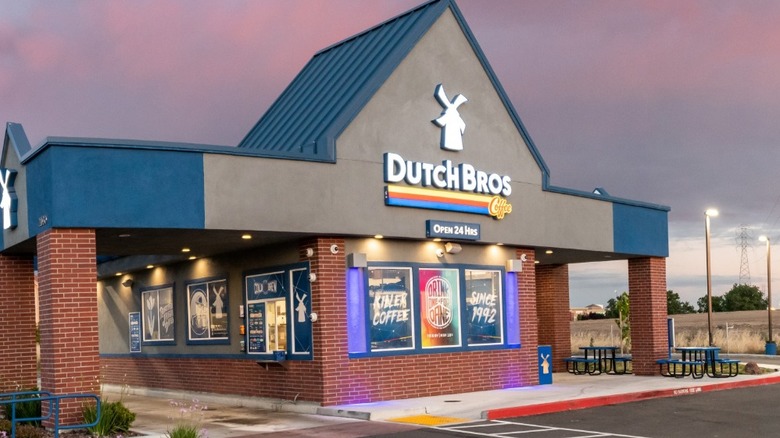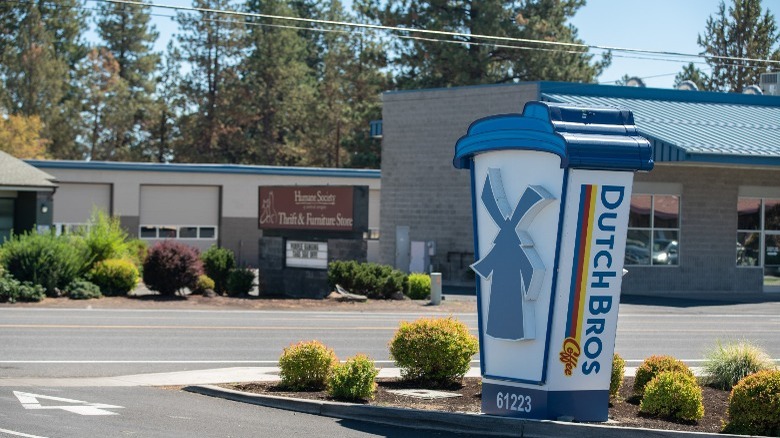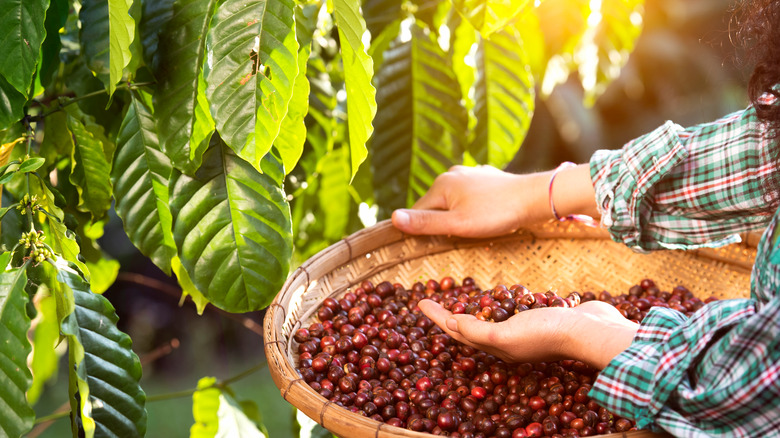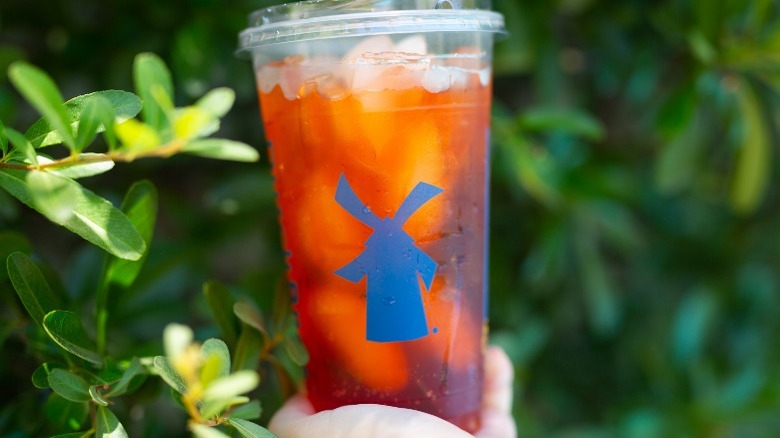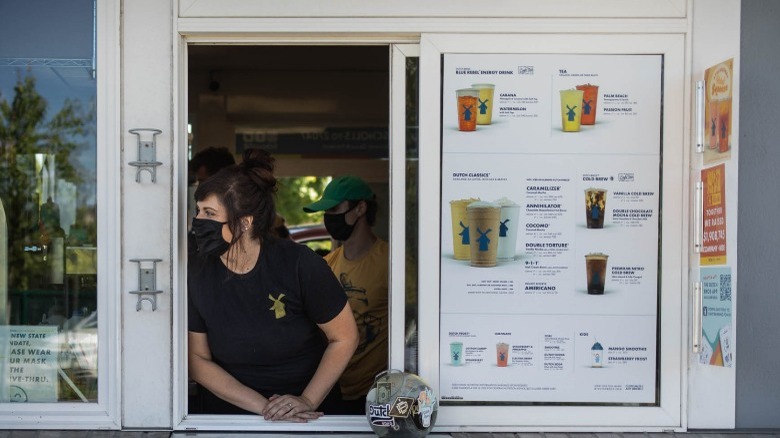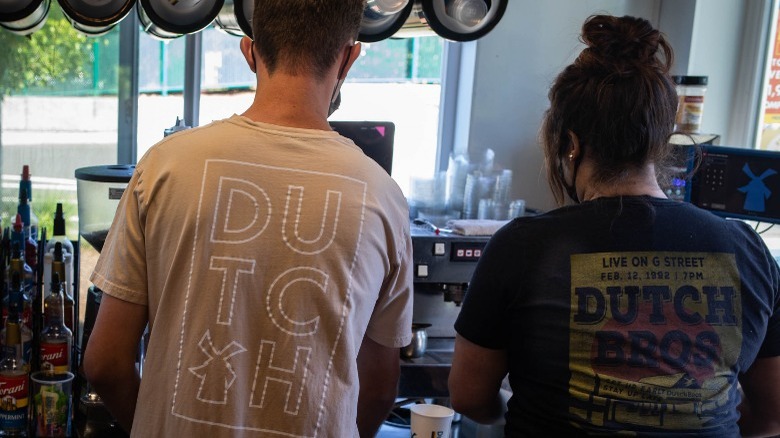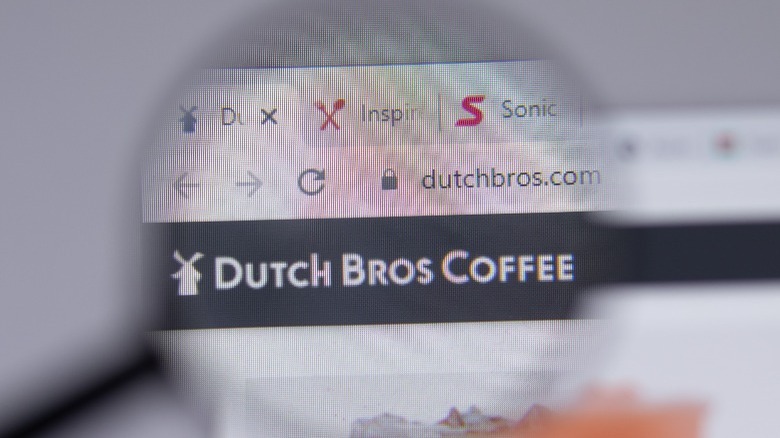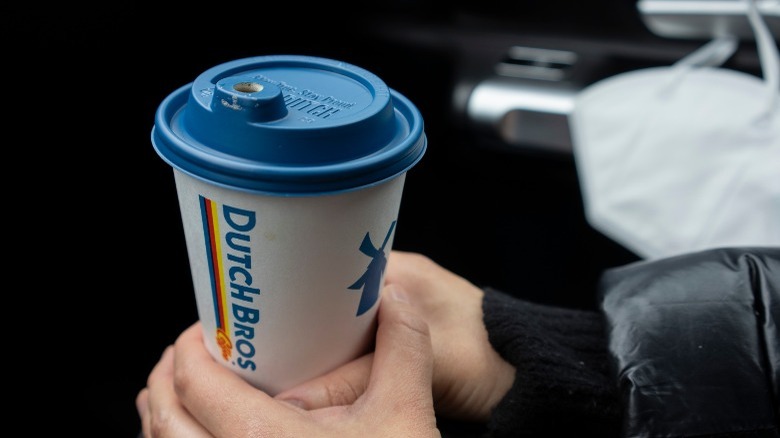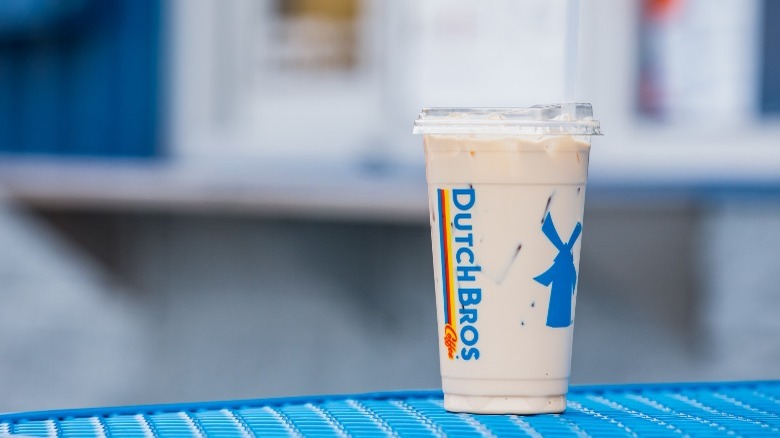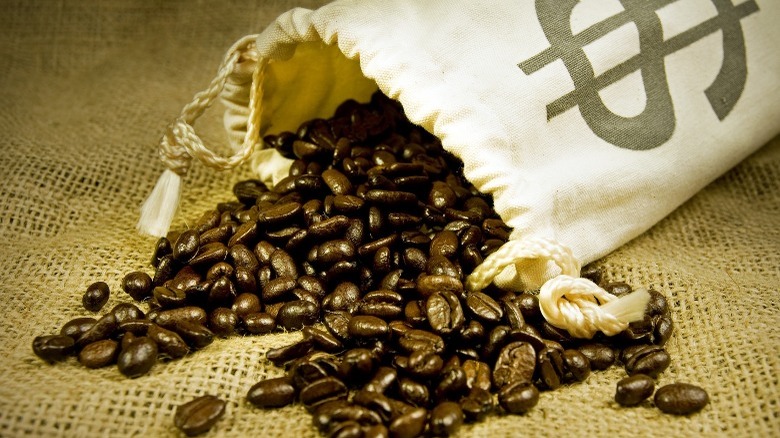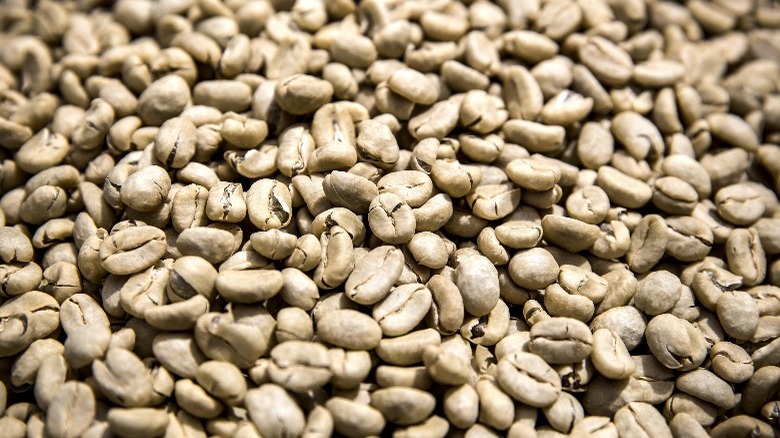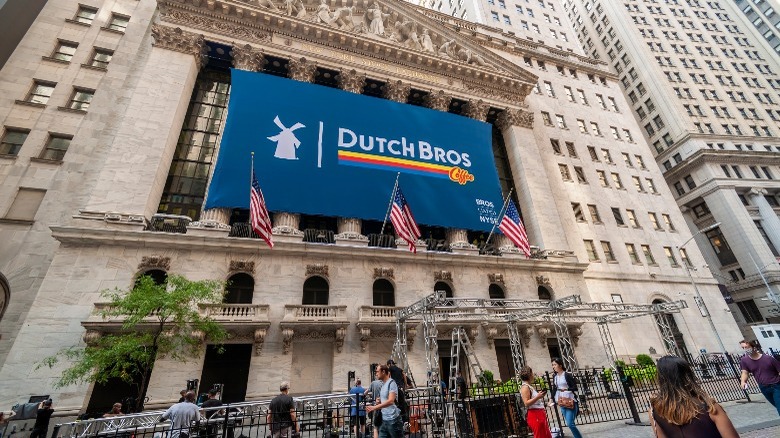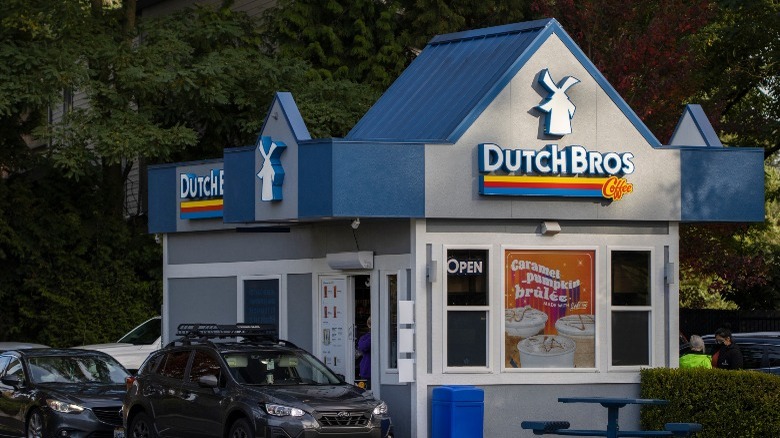The Untold Truth Of Dutch Bros Coffee
As a main competitor of Starbucks for coffee consumer dollars, Dutch Bros has become a true presence on the caffeine scene. From humble beginnings in the early '90s to a growing public franchise operating hundreds of locations in 11 states, Dutch Bros has found its place among the local cafes and coffee chains cropping up through the decades. A proven formula of tasty drinks and outstanding customer service has put these drive-thru broistas on the map. Dutch Bros may not have the kind of presence that Starbucks has, but they're doing their best to remedy that as quickly as possible.
But there's more to the Dutch Bros story than just crafty beverages. Sure, the company make amazing drinks that have customers lining up around the block. And yes, its profile has grown exponentially in spite of its currently limited expansion through the U.S. Like any great brand worth its market-busting IPO, this one has secrets, surprises, and a compelling history that make the Dutch Bros story an untold truth worth telling. From trademark flavors to personal triumphs, there's a frothy round of caffeinated truth ready to be served up.
And yes, the bros who started the company are actually Dutch. They're actually brothers, too. Good things to know.
Dutch Bros started as a coffee cart in Oregon
In 1992, founders Travis and Dane Boersma were looking for fulfillment and a transition from their jobs on the family dairy farm in Grants Pass, Oregon. It was Travis's idea to put their energy into coffee, specifically espresso. In these early days of the Grunge decade, espresso was still catching on; Starbucks had yet to proclaim caffeination domination over the world at large. So the brothers jumped into the caffeine biz with both feet, purchasing a coffee cart and peddling their wares at a nearby railway station. And Dutch Bros was born!
In less than a decade, the dedicated customers who couldn't get enough of their Dutch Bros brew had funded the brothers' first franchise expansion. It wasn't long before other locations started popping up. It would be another eight years before the Bros would offer franchises company workers and many more before the company went from private to public, maintaining a standard that helped many of their workers advance to owner's status. In the cutthroat world of "grow at all costs" business, Dutch Bros kept integrity as one of their guiding principles.
They use responsibly sourced beans from Brazil, Columbia, and El Salvador
The coffee industry has been evolving to make sure coffee growing is a responsible, sustainable industry, and that coffee growers in Central and South America are treated fairly. As part of this movement, Dutch Bros is committed to using only beans that have been responsibly sourced from farms in Brazil, Columbia, and El Salvador. These regions are famous for their arabica beans, which can take years to grow. By incorporating a culture of responsibility, Dutch Bros holds its product to the same standards of excellence to which it holds its locations.
But environmentally responsible doesn't mean organic, and Dutch Bros doesn't claim to serve organic coffee. The conditions required for producing organically-grown coffee carry the risk of irreparable damage to the plants, which can close down whole coffee farms and ruin local economies. Dutch Bros commits resources instead to helping farmers overcome their environmental hurdles by supporting trade organizations that specialize in solutions. They also support biodiversity in the coffee-growing regions through a partnership with Rainforest Alliance. By taking care with the coffee the brand purchases, Dutch Bros has been able to support the community that grows its product and gives back to the land in meaningful ways. And that actually does amount to a hill of beans in this world.
The cold drinks are funkier than Starbucks
If frapped, blended, or iced drinks are your cup of tea — er, coffee — you might be interested to know that Dutch Bros has a whole line of its own frosty specialties. These are no Frappucinos, which is specifically a Starbucks thing, no matter where you try to order them from. Instead, dutch Bros applies its maverick spirit to a smoothie menu that gives you fresh fruit flavors in a fluffy cold beverage. There is also a proprietary energy drink called, appropriately enough, Rebel Energy Drink®, which adds caffeine to a mix of multi-hued syrups for a colorful kick.
Dutch Bros also offer its own expansive selection of refreshing carbonated drinks called Dutch Soda™, which come in flavors with mind-blowing names like Electric Berry, Astronaut, Unicorn Blood, and Hyperchrome. Each soda is a blend of flavored syrups made into sparkling sips with soda water. While Starbucks experimented with its own sodas years ago, the line fizzled. Dutch Bros, on the other hand, seems to have the fresh-soda-at-a-coffee-shop market cornered.
Dutch Bros has a secret menu ...
As any self-respecting food industry phenom should, Dutch Bros has a secret menu that only the most diehard customers — or anyone with an internet connection and a search engine — has access to. Ask for a Bob Marley, and you'll end up with a dark chocolate-coconut-banana blend named for the king of reggae. Order a Cookie and you'll get coffee, steamed half-and-half with shots of chocolate macadamia nut and white chocolate syrup that tastes like ... yep, a cookie. As long as you know the right password, you can have your simple coffee beverage doctored up Hawaiian-style, made dirty, or turned Irish. It may be as much fun memorizing the menu as it is to order the drinks!
Depending on your source, you may also happen upon a section of the Dutch Bros secret menu that includes Frosts. These are Dutch Bros versions of old-fashioned milkshakes with a new-fangled twist, featuring flavors like Cinnabon, Birthday Cake, and Peppermint Bark. The locations may not offer indoor seating, but Dutch Bros does everything it can to provide its devoted following with a full-service coffee shop experience — and a soda shop experience, too.
Customer service is the Dutch Bros special ingredient
The Dutch Bros workers are a happy, energetic crew, most likely getting high on their own supply. Of caffeine, that is. Genuine friendliness is a necessary feature in every employee who dons their company-apportioned Dutch Bros windmill-covered t-shirts. Loyal Dutch Bros drinkers return time and again, for more than just the excellent beverages. Their trip through the line is an experience with every trip, with cheerful service that makes them feel like they're the only customer who matters.
Customer service like this is a key performance indicator for continued customer satisfaction. This may seem obvious, but Dutch Bros doesn't take it for granted. The company is committed to hiring naturally outgoing workers to fill its positions in order to keep customers feeling like they matter. That, coupled with double-shots of espresso and a hearty dose of sugar and cream, gives Dutch Bros aficionados a coffee house experience they can't get anywhere else.
It's giving the other chains a run for their money
The chain coffee scene is littered with mom-and-pop shops that couldn't hold their own against the big baristas on the block. With Starbucks dominating the market and Dunkin rebranding to make coffee its main focus, it can be hard for a company to find its place. But Dutch Bros is proving to be the little coffee chain that could, and is establishing a name for itself among the superstars by doing its own thing. In an industry where familiarity equals comfort, Dutch Bros' individuality is a stirring change of pace.
If Starbucks is your dad's coffee shop of choice, then Dutch Bros is your cool older sister's place for getting her caffeine fix. In particular, a majority of students surveyed are drawn to Dutch Bros for its happenin' vibe and its extensive menu. Flavor also counts in the coffee competition; Dutch Bros is said to be less bitter than Starbucks, a sharp blow to the java champ's sterling reputation. Dutch Bros also offers better prices on its drinks than Starbucks, likely due to low overhead costs for the mostly drive-thru constructions.
Co-founder Dane Boersma succumbed to ALS in 2009
In 2005, in the midst of his company's phenomenal growth, Dutch Bro Dane Boersma developed troubling symptoms that eventually led to a diagnosis of ALS, also known as Lou Gehrig's Disease. ALS is a degenerative disease that affects nerve cells in the spinal cord and brain. Those affected with ALS gradually lose motor function and the ability to move freely. Boersma struggled with symptoms for over five years, ultimately succumbing to the dreadful disease at age 55.
Boersma's death in 2009 dealt a blow to the community he'd help build. His enthusiasm for the coffee company he helped found was a key element in Dutch Bros success, and his dedication to improving himself as an entrepreneur and a leader were influential on his brother and the company culture. His life was a celebration of family, friends, music, and, of course, coffee. The spirit he helped instill in Dutch Bros remains a pillar of the company's continued success.
Its support for the Muscular Dystrophy Association is in Dane Boersma's honor
Though Dutch Bros maintains a philanthropic profile that helps the local communities of its many franchisees, the company's commitment to helping those with ALS is its charitable north star. With Boersma's son Brant on board as Chief Culture Office, Dutch Bros has put its community support to work raising funds to provide care, determine a cause, and deliver a cure for ALS through the Muscular Dystrophy Association. Through the annual fundraising drive called Drink One for Dane, Dutch Bros has raised over $10 million since the event began in 2005. For one full day every May, all locations participate in the effort to bring in dollars through donations and merch sales onsite and online. Totals have reached upwards of $1.9 million in a single year.
Drink One for Dane has become another element of the Dutch Bros community that makes customers feel like part of a family. The personal connection for customers contributing to help cure the disease that took a founding brother of their favorite coffee shops extends to those suffering from ALS who are helped directly by the company's charitable spirit.
Being an owner is a profitable enterprise
For entrepreneurial coffee lovers hoping to cash in on the Dutch Bros vibe, becoming a franchisee can be quite lucrative. Per industry trackers, a Dutch Bros location can bring in over $650,000 in revenue in a business year and net the owner over $100,000 in profit. As with any franchise, these figures can vary among locations. But the popularity of the brand and its phenomenal drive for growth signify that a Dutch Bros popping up in a new location can turn a pretty penny if conditions are favorable. Though the investment for a franchise can be considerable, with so much high-strung optimistic buzz surrounding the chain, it may be a risk worth taking.
But before anyone jumps feet first into the deep end of the coffee pot, Dutch Bros requires at least three years within the company before they'll consider offering anyone the opportunity. There's a ladder workers can climb to reach the upper echelons of success within Dutch Bros. It starts by becoming a broista, with stops at shift leader and shop manager. The top rung brings the opportunity of becoming a full-fledged operator. So becoming a Dutch Bros owner is strictly an inside job.
Unlike Starbucks, seasonal flavors change every year
It may be PSL season for Starbucks lovers come late August, but for Dutch Bros fans, there's no telling what the holiday season will bring. Every year, the special holiday menu is slightly different than the last. If you love Pumpkin Pie Breve one year, you may have to get used to Caramel Pumpkin Brûlé the next. The Candy Cane Cold Brew or Peppermint Bark Freeze you savored as the Coffee of Christmas Past might give way to Peppermint Bliss Cold Brew as the Coffee of Christmas Future. It all depends on the company's wit and whim when the season comes around. And it's not just the holidays that get special treatment; locations spin out new flavor combos and taste sensations for coffee and energy drinks on a regular basis. Flavor innovation seems to be the way of the Bro.
If you're a creature of coffee habit and you depend on familiar flavors cycling through each year, take heart: Dutch Bros' bagged beans include the seasonally flavored Winter Glow, a lighter roast that lets you enjoy a warm cup from the comfort of your cozy home. Though the label may change from year to year, Winter Glow is an annual tradition ... so far.
Dutch Bros' trademark white coffee is highly caffeinated ... maybe
A fact commonly known to true coffee enthusiasts is summed up in a simple rhyme: the lighter the roast of the bean, the higher the kick of caffeine. Simply stated, the longer the beans stay in the roaster, the more of the addictive substance that gets coffee lovers buzzed each morning burns away. Dutch Bros knows this, and it use this devious truth to brew a trademark white coffee that is dangerously caffeinated to the max. Ironically named white coffee, it consists of beans that are partially roasted for a coffee variant that comes with its own profile. Does this compromise the chocolate-nutty-roasty-good flavor of the coffee? Apparently, it does, which makes white coffee an acquired taste. White coffee seems to have its own special appeal, and some coffee lovers actually prefer it. But that extra caffeine jolt is worth the change ... or is it?
White coffee, it turns out is nothing new. It originated in Yemen in the early-1900s, though it took a while to make its way stateside. Now that it has, Dutch Bros has made it uniquely its own — among the coffee chain set, at least — the real truth can be told: the difference in caffeine content is nominal at best. Still, the company may be onto something with its white coffee offerings, as this type of bean has become popular with home coffee brewers in recent years. Being a coffee maverick has its perks after all.
The brand's 2021 IPO made the founder a billionaire
Remember the Dutch Bro who had to be convinced by the other Dutch Bro that an espresso pushcart was a sound business idea? Well, he's a billionaire now. When Dutch Bros launched its little coffee chain into the realm of public companies with an IPO in 2021, Travis Boersma's net worth jumped to $1 billion. The company was aiming for a valuation of $3.3 billion, and its stock was initially offered at $23 per share, though that quickly rose to nearly $37 per share by the end of its opening day.
All this money movement may have made Oregon's King of Coffee a very wealthy man, but that didn't change his rebel spirit. Rather than giving in to the suit-and-tie culture of the Wall Street wolves, Boersma wore a laid-back flip-flops and a rock t-shirt combo to his first day of trading. This was a signal to the corporate world that becoming a public-traded operation wasn't about to alter the down-to-earth energy that makes Dutch Bros such a beloved alternative to the more upscale corporate coffee conglomerates. It's a special kind of success when super prosperous people retain their connection to their community. It's even more special when the good guys get their day in the sun.
Dutch Bros is planning to add hundreds of new locations
Despite its modest beginnings, Dutch Bros is quickly becoming a major player in the coffee arena. Its public offering was accompanied by an announcement of a planned mass expansion, with 125 franchises opening in a single year and an intended total of 4,000 locations overall. Initial expansion will take Dutch Bros eastward in 2022, with plans for a new roastery in the Midwest to help source coffee for the new shops. There's no known timeframe for this explosive growth, but with exposure in a limited number of states so far, the remaining domestic market is rich territory for this laid-back competitor to show its might. And that's not to mention possible expansion on international shores.
Though the possibility of conquering foreign markets hasn't been disclosed, it would seem a logical next step for the super friendly coffee company that's only moving up in the world.
